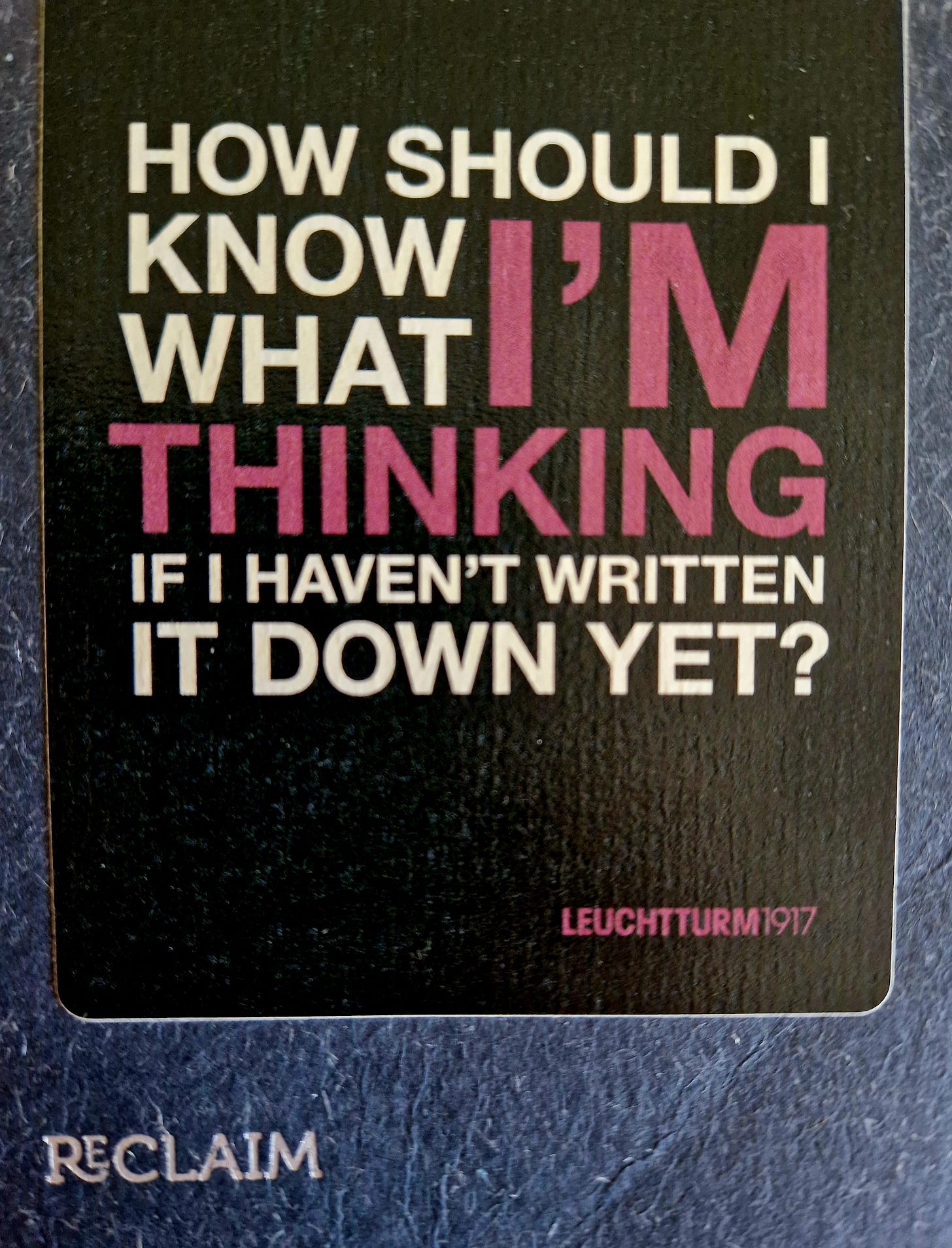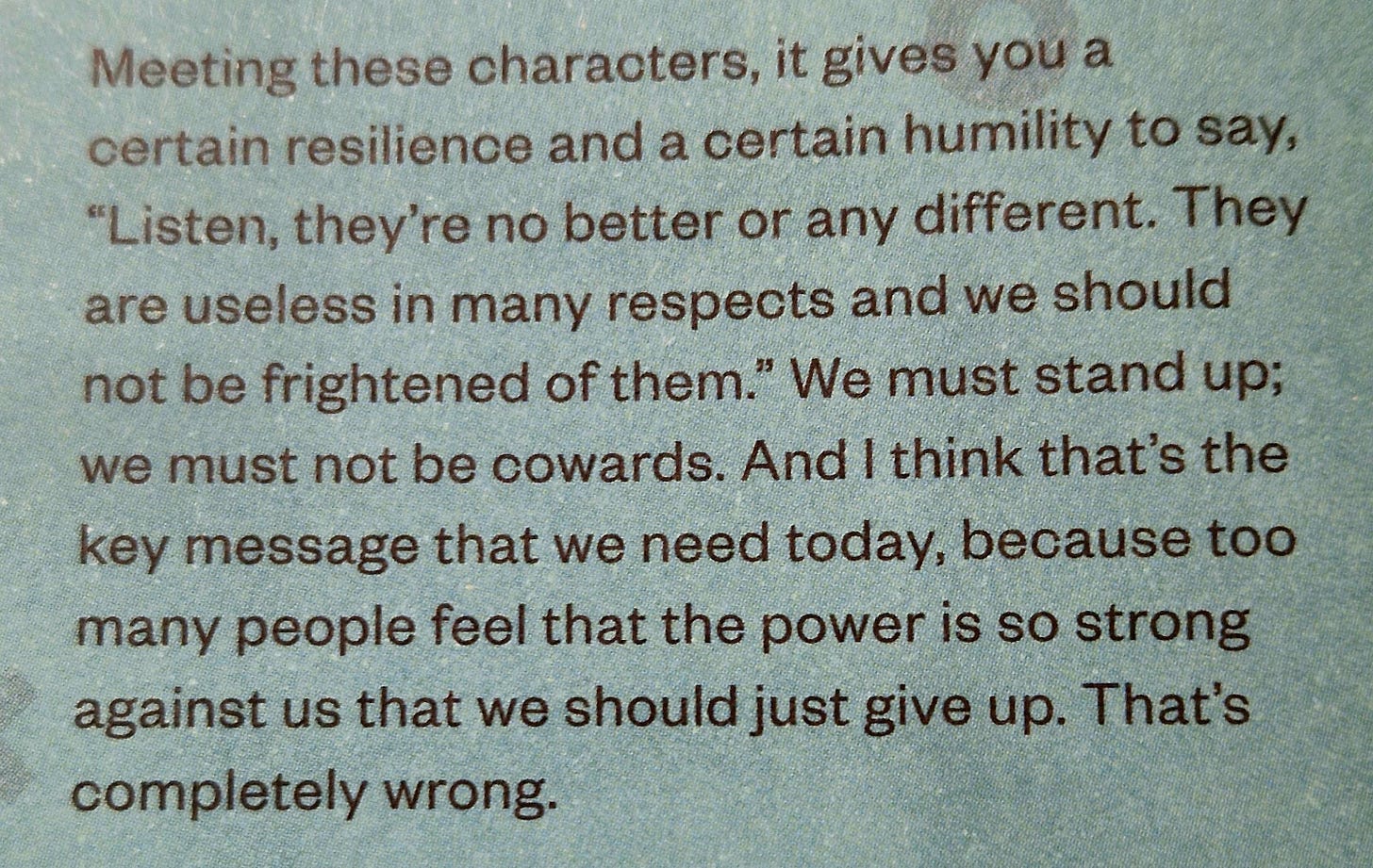Shifting from feeling powerless to an educated and active citizen
Thinking about what I've learnt, and what it MEANS
"How should I know what I'm thinking if I haven't written it down yet?"
This quote, on a sticker that accompanied a recent notebook purchase, perfectly sums up one of the things I've been trying to do for the past couple of years.
Image: A sticker on a ReCLAIM notebook that says ‘How should I know what I’m thinking if I haven’t written it down yet?
I read a lot, I consume other people's writing, thoughts and conclusions. But I've always struggled to have my own opinion. It's part and parcel of being both a thoughtful observer and independent researcher, I think. At work, I watch my bias, gather information for clients, and make recommendations based on what I discover, but I'm rarely asked for my opinion, and often stumble over surfacing what that is.
So all of this reading, watching and listening I do ends up in a jumble in my head (this makes it incredibly hard to switch off). I don't take the time to articulate what I'm consuming means - for me, for the world I live in and to the other people in it.
This piece is the culmination of much reading. Reading about these things 👇
Power / Powerless.
Passive consumer / Active citizen.
Arrogant / Humble.
Inequality / Shared experiences.
Reading a 2019 interview with Guy Standing in Ethos Magazine (issue 11) today, I was struck by this paragraph (he'd just met Henry Kissinger, an arch nemesis for him when he was a 1960s student ).
"Too many people feel that the power is so strong against us that we should just give up. That's completely wrong."
I believe that there is a cohort of people, including me, that sits BETWEEN the people being individualistic (who use their power to steamroll) and the people who hang on their coattails (the 24% of people in a recent Economist survey who now support the hard right).
These two types of people power were described by Erica Benner at a recent Adventures in Democracy event, hosted by Jon Alexander (he named his series after Erica's book).
The cohort that sits between these opposites (those opposites who work together to undermine the society I want to see) are people like me who've long felt powerless in the face of the seemingly uncontrollable global forces which undermine us. But we're waking up now. Having previously felt that it's easier to do nothing, stick my head in the sand, and assume it'll blow over, I now know I have more agency than I realised. More importantly, I am not alone.
There are others like me, others who feel the same but have agency and have the opportunity to "use your voice, not just your ears" (Jon Alexander).
But as Erica Benner, political thinker, academic and author, says, "we have to share this world." We also have to "share power with people we disagree with", or we will never be free and have agency.
Rob Harrison Plastow wrote a piece on LinkedIn recently about the oat latte paradox, "why well-off Brits who think collapse is coming still stay silent". It hits hard, but it's important to accept that there are so many of us, me included, who keep buying our oat lattes (or coconut milk, if I'm feeling really fancy) who are climate disaster aware and collapse conscious, and try to do what we can to prevent the disaster, but grief and horror paralyses us. We need to move beyond this paralysis, see the potential for action and act.
Taking up space vs knowing your place
I have a kid. A kid who I want to have a good, safe and exciting future. I don't want to just be an educated observer of injustice and chaos. I want to show up and defend honesty, equality, and celebrate humility.
My default was always to retreat. As a young woman, I was taught to avoid trouble, to prevent it from coming my way. Drink always made me bolder when I was young, but it didn't always end well, for me or for others. I’ve learnt that showing up and standing up for what’s right isn’t troublesome, it’s brave, and it’s the right thing to do.
I particularly loved 2 questions an audience member at the Erica Benner/Jon Alexander event posed (I don't know who she is, but let me tell you, she's great at asking questions):
What does it mean to be a citizen?
Who taught you to be a citizen?
For me, what makes me a citizen is the ability to empathise and to seek out the 'Why'.
Why do the powerful do what they're doing?
Why do the people who follow them and support them do so?
There are a myriad of reasons, all too complex to get into here, but my advice would always be to be mindful not to stereotype and ensure you are open to understanding others' motives and reasoning. It's no wonder that 84% of people feel like they have no power in decisions affecting them on a local level in a Big Issue survey, but I believe those people underestimate the power of understanding our divisions (without judgement), being open to discussions with those we don't agree with, and our collective agency.
Useful Resources
I’ve read a lot of things in the past year, watched a fair few interviews, and listened to podcasts and books. So I thought I’d recommend a few in an effort to help others understand the history and context of combatting powerlessness, and to learn how to show up and exercise empathy and humility from some of the best.
(I've recently discovered that if you have a Spotify subscription, many audiobooks are on there, and of course, you can borrow books, ebooks and audiobooks from your local library - and maybe talk to some people too!).
Adventures in Democracy series Jon Alexander (author of Citizens, another recommendation) has been hosting at The Conduit.
C.L. (Cindy) Skach's How To Be A. Citizen (published in paperback as Outlaw).
Rob Hopkins' From What Is To What If
Tom Fletcher's Leading interview and his book Ten Survival Skills for a World in Flux.
Fiona Hill's There is Nothing For You Here.
What If We Get It Right compiled by Dr Ayana Elizabeth Johnson.
Baratunde Thurston and Jon Alexander's week of citizening Stories (stories the media doesn't prioritise, but there is an appetite for).
And if this all gets too much, lose yourself in fiction (Babel by RF Kuang and The Devil and the Dark Water by Stuart Turton are absorbing distractions).
AND get a copy of Positive News, a wonderful example of "constructive journalism", as Sean Dagan-Wood, the magazine's steward, describes it.
Last word(s)
Be an active consumer of words and ideas. Don’t assume that others know more, and better, than you. You are allowed to have opinions and to speak up. You won’t always be right, or agreed with, but it’s ok to be challenged and to agree to disagree (or even change your mind!).
I won’t have read or learnt everything useful on this topic, and that’s ok. Sometimes I have to retreat into fiction or crappy TV to rest my mind.
Let’s give the marvellous Oliver Burkeman the very last word (from Four Thousand Weeks: Time Management for Mortals - more book recommendations, sorry):
“The day will never arrive when you finally have everything under control—when the flood of emails has been contained; when your to-do lists have stopped getting longer; when you’re meeting all your obligations at work and in your home life; when nobody’s angry with you for missing a deadline or dropping the ball; and when the fully optimized person you’ve become can turn, at long last, to the things life is really supposed to be about. Let’s start by admitting defeat: none of this is ever going to happen.”





I love reading your thoughts Lynda, you always have interesting, useful and considered things to say.
Your article is wonderful. Ince i refuse to give up on this world of chaos, I've finally learned to use my voice in things that matter to me. It's very liberating!